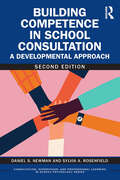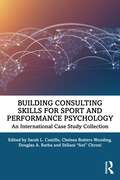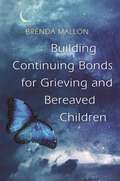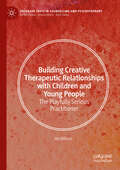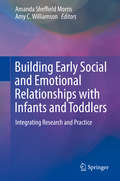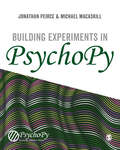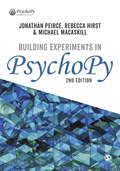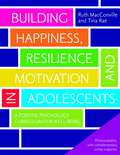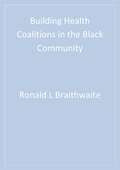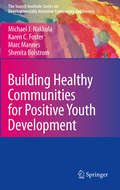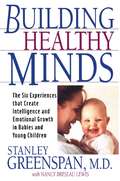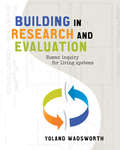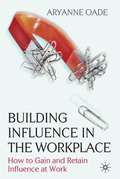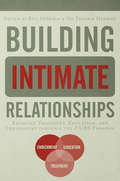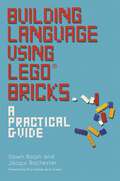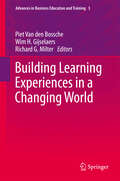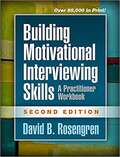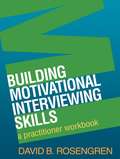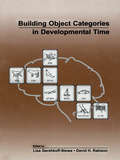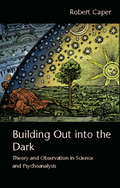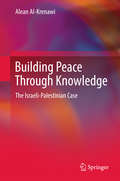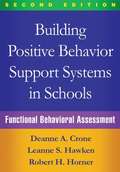- Table View
- List View
Building Competence in School Consultation: A Developmental Approach (Consultation, Supervision, and Professional Learning in School Psychology Series)
by Daniel S. Newman Sylvia A. RosenfieldBuilding Competence in School Consultation, Second Edition, directly addresses the need for practical, comprehensive consultation training, including support materials, for school psychologists, counselors, and other professionals working in schools. School psychologists consistently indicate that consultation is a crucial component of their duties but that they lack sufficient opportunities to develop their corresponding knowledge, skills, and confidence during graduate training. Drawing from evidence-based approaches as well as experienced instructors’ real-world toolkits, these essential perspectives and activities approach the standard and less common challenges of the school consultant role.Written by two leading experts in consultation, this book brings school psychology research directly to graduate students and both novice and experienced practitioners, providing invaluable context, reflection activities, videos from fellow consultation experts, and resources that translate academic findings into skills ready for immediate use. This revised and expanded second edition includes two new chapters - one on collaboration and consultation on teams and another on teleconsultation – along with thoroughly updated content related to socially just and culturally responsive consultation practices; refreshed practice materials including rubrics and videos; references to newly published research and the latest professional standards; and updated activities for readers, all of which are freely downloadable.
Building Consensus: Conflict and Unity
by Monteze M. SnyderStep-by-step guide to pursuing consensus decision-making in a variety of settings.
Building Consulting Skills for Sport and Performance Psychology: An International Case Study Collection
by Chelsea Butters Wooding Douglas A. Barba Stiliani “Ani” Chroni Sarah L. CastilloBuilding Consulting Skills in Sport and Performance Psychology is an international compilation of case studies that introduces students and early career professionals to pertinent issues within a variety of performance environments. With contributions from prominent international practitioners, the book offers case studies from a variety of performance environments including sport, performing arts, and high-risk occupations. Each chapter presents a case study and provides exploratory questions relating to ethical considerations, intervention planning, and awareness of diverse themes of race, culture, gender, immigration status, and disability, among others. These reflection questions encourage students to acknowledge the individual circumstances of all performers and to recognize their own unique background and how this impacts their attitudes, beliefs, and connection to potential clients. The text promotes honest self-reflection regarding consulting strengths and potential areas for improvement, and an online Instructors’ Manual looks at possible solutions for each case. The book will be essential reading for supervisors, mentors, students, and professionals engaged in providing consulting services in distinct performance environments. It encourages its readers to use careful self-reflection to integrate theory and practice and refine their own consulting philosophies.
Building Continuing Bonds for Grieving and Bereaved Children: A Guide For Counsellors And Practitioners
by Brenda MallonThe period following the death of a friend or loved one can be tumultuous for anyone, but can be especially difficult for children, with lasting effects if the loss is not acknowledged or supported. This book emphasises the importance of listening to children and helping them to create positive bonds that can sustain them as they go through their lives. It provides practical, creative approaches to support children in their time of bereavement and to those whose loved one is dying. By recognising feelings of pain, anger, and confusion through open and positive discussions, a child is able to build emotional resilience and create enduring memories of the person they have lost. The author explains the importance of developing continuing bonds between children and loved ones in times of bereavement and offers practical ways in which these bonds may be nurtured through creative activities, memory making, and personal storytelling.
Building Creative Therapeutic Relationships with Children and Young People: The Playfully Serious Practitioner (Palgrave Texts in Counselling and Psychotherapy)
by Jim WilsonThis textbook elucidates core systemic ideas, methods and skills which are useful and effective in building creative therapeutic relationships with children and young people in family/systemic therapy and practice. The aim of the book is to invite practitioners and therapists working with this client population to extend their &“repertoire&” of skills and ideas towards better therapeutic outcomes. This book outlines key elements to help practitioners find useful, effective means to meet, engage and help children and their families, alongside illustrating a range of skills through vignettes and in-depth case studies to highlight creative possibilities underpinned by a clear conceptual framework. It also offers a condensed and accessible insight into what contributes to creative practice in meeting children and young people. This approach allows a degree of spontaneity in practice, centering therapy as a process of humanisation. The book also provides a detailed exploration of the practitioner&’s style of work, ethics and an examination of the social, organisational and political aspects of the contexts of practice
Building Early Social and Emotional Relationships with Infants and Toddlers: Integrating Research and Practice
by Amanda Sheffield Morris Amy C. WilliamsonThis book provides a comprehensive overview of the process of building healthy early social and emotional relationships with infants from a developmental perspective. The book synthesizes current research on the contextual influences of attachment, family relationships, and caregiving practices on social-emotional development. Chapters examine the processes of socioemotional development—particularly in relationships with parents, other family members, and peers—and identify areas for promoting healthy attachments and resilience, improving caregiving skills, and intervening in traumatic and stressful situations. Chapters also present empirically-supported intervention and prevention programs focused on building early relationships from birth through three years of age. The book concludes with future directions for supporting infant mental health and its vital importance as a component of research, clinical and educational practice, and child and family policy. Topics featured in this book include:The effect of prenatal and neonatal attachment on social and emotional development.The impact of primary relationships and early experiences in toddlerhood.Toddler autonomy and peer awareness in the context of families and child care.Supporting early social and emotional relationships through The Legacy for Children™ Intervention.How to build early relationship programming across various cultures. Building Early Social and Emotional Relationships with Infants and Toddlers is a must-have reference for researchers, clinicians and professionals, and graduate students in the fields of infant mental health, developmental psychology, pediatrics, public health, family studies, and early childhood education.
Building Experiments in PsychoPy
by Jonathan Peirce Mr Michael MacAskillPsychoPy is an open-source (free) software package for creating rich, dynamic experiments for psychology, neuroscience, and linguistics. It provides an intuitive graphical interface (the ‘Builder’) as well as the option to insert Python code. This combination makes it easy for teaching, but also flexible enough for all manner of behavioural experiments. Divided into three parts, this textbook is suitable for teaching practical undergraduate, or as a reference text for the professional scientist. The book is written by Jonathan Peirce, the original creator of PsychoPy and Michael MacAskill, and they utilise their breadth of experience in Python development to educate students and researchers in this intuitive, yet powerful, experiment generation package.
Building Experiments in PsychoPy
by Jonathan Peirce Mr Michael MacAskillPsychoPy is an open-source (free) software package for creating rich, dynamic experiments for psychology, neuroscience, and linguistics. It provides an intuitive graphical interface (the ‘Builder’) as well as the option to insert Python code. This combination makes it easy for teaching, but also flexible enough for all manner of behavioural experiments. Divided into three parts, this textbook is suitable for teaching practical undergraduate, or as a reference text for the professional scientist. The book is written by Jonathan Peirce, the original creator of PsychoPy and Michael MacAskill, and they utilise their breadth of experience in Python development to educate students and researchers in this intuitive, yet powerful, experiment generation package.
Building Experiments in PsychoPy
by Jonathan Peirce Rebecca Hirst Michael MacAskillPsychoPy is an open-source software package for creating rich, dynamic experiments in psychology, neuroscience and linguistics. Written by its creator, this book walks you through the steps of building experiments in PsychoPy, from using images to discovering lesser-known features, and from analysing data to debugging your experiment. Divided into three parts and with unique extension exercises to guide you at whatever level you are at, this textbook is the perfect tool for teaching practical undergraduate classes on research methods, as well as acting as a comprehensive reference text for the professional scientist. Essential reading for anyone using PsychoPy software, the second edition has been fully updated and includes multiple new chapters about features included in recent versions of PsychoPy, including running studies online and collecting survey data. Part I teaches you all the basic skills you need (and some more advanced tips along the way) to design experiments in behavioral sciences. Each chapter introduces anew concept but will offer a series of working experiments that you can build on. Part II presents more details important for professional scientists intending to use PsychoPy for published research. This part is recommended reading for science professionals in any discipline. Part III covers a range of specialist topics, such as those doing fMRI research, or those studying visual perception. "This book fills an incredibly important gap in the field. Many users of PsychoPy will be excited to learn that there is now a highly accessible and well-designed written guide to refine their skills." – Susanne Quadflieg, University of Bristol
Building Experiments in PsychoPy
by Jonathan Peirce Rebecca Hirst Michael MacAskillPsychoPy is an open-source software package for creating rich, dynamic experiments in psychology, neuroscience and linguistics. Written by its creator, this book walks you through the steps of building experiments in PsychoPy, from using images to discovering lesser-known features, and from analysing data to debugging your experiment. Divided into three parts and with unique extension exercises to guide you at whatever level you are at, this textbook is the perfect tool for teaching practical undergraduate classes on research methods, as well as acting as a comprehensive reference text for the professional scientist. Essential reading for anyone using PsychoPy software, the second edition has been fully updated and includes multiple new chapters about features included in recent versions of PsychoPy, including running studies online and collecting survey data. Part I teaches you all the basic skills you need (and some more advanced tips along the way) to design experiments in behavioral sciences. Each chapter introduces anew concept but will offer a series of working experiments that you can build on. Part II presents more details important for professional scientists intending to use PsychoPy for published research. This part is recommended reading for science professionals in any discipline. Part III covers a range of specialist topics, such as those doing fMRI research, or those studying visual perception. "This book fills an incredibly important gap in the field. Many users of PsychoPy will be excited to learn that there is now a highly accessible and well-designed written guide to refine their skills." – Susanne Quadflieg, University of Bristol
Building Happiness, Resilience and Motivation in Adolescents: A Positive Psychology Curriculum for Well-Being
by Tina Rae Ruth MacconvillePositive psychology focuses on building strengths and developing creative and positive thinking in order to boost happiness, well-being and achievement. It helps people to be motivated, maintain positive mental health, and to flourish in all areas of their lives. This resource is a fully-formed positive psychology programme designed to promote happiness, resilience and motivation in young people aged 11-18. It introduces the theory and research behind positive psychology, and includes a guidance section for facilitators on how to deliver the programme. The programme itself is made up of 24 chapters which reflect each of the 24 'character strengths' identified by Martin Seligman, the founder of positive psychology. These strengths include creative thinking, kindness, fairness, leadership, forgiveness, and teamwork. Activities teach students how to develop these strengths and skills in order to initiate positive change in their lives. This resource provides teachers, counsellors, psychologists, social workers and others working with young people with a complete programme to promote well-being in young people and help them flourish in their lives.
Building Health Coalitions in the Black Community
by Sandra E. Taylor Ronald L. Braithwaite John N. Austin"The book is especially useful for researchers, policymakers, public health practitioners, and community leaders who have limited experience in both health coalition building, and working with the African American community in particular." CONTEMPORARY SOCIOLOGY "An important book for African Americans nationwide; I believe it will make a real impact on the way we view comprehensive health care for communities of color in this country." Kweisi Mfume, President and CEO, NAACP In Building Health Coalitions in the Black Community, Professor Ronald Braithwaite and his colleagues examine the phenomenon of coalition building with respect to diverse problems and situations they have encountered in their research. The result is a significant contribution to knowledge of the method of coalition development and its application in African American Communities. The book begins with a historical review of health care and collaboration involving the African American population generally. The second chapter reveals federal and research foundation support for coalition building. Following this are discussions addressing a wide range of issues relating to coalitions in the African American Community: The theoretical basis of coalition building and coalitions in urban communities; The role of formative, process and summative evaluation in coalitions generally, with examples of coalitions combating drug use; The benefits that proceed from collaborations between African American religious institutions and public health officials, and the role, selection and training of lay health advisors; Ways coalitions in the African American community have responded to environmental issues such as hazardous waste facility siting; Students in a variety of health science and related disciplines (public health, nursing, medicine, and allied health, social work, psychology, sociology, health education) will find this an excellent general introduction to health promotion in African American communities.
Building Healthy Communities for Positive Youth Development (The Search Institute Series on Developmentally Attentive Community and Society #7)
by Michael J. Nakkula Shenita Bolstrom Marc Mannes Karen C. FosterThe Healthy Communities Healthy Youth (HC HY) project has provided grassroots support for the creation of robust, welcoming environments not only for children and adolescents at risk but for all youth. Building Healthy Communities for Positive Youth Development explains the Developmental Assets framework in depth and demonstrates how eight local initiatives across the country have adapted and implemented it to fit the unique cultures and resources of their neighborhoods and the needs and strengths of their young people. Stakeholders collaborating in the process include parents, educators, politicians, service providers, law enforcement, volunteers, and?as active participants instead of merely recipients of services?youth themselves. In this visionary book, the authors provide readers with a flexible, living blueprint for promoting the well-being of children and teenagers. Areas of coverage include: Core themes of the eight HC HY initiatives. The use of an asset-based common language among participants. Building common ground among the various sectors involved in the initiatives. The varied roles of young people within the initiatives. Research design and methodology; data collection and interpretation. Funding issues and challenges. The mission outlined in Building Healthy Communities for Positive Youth Development fits the interests of a wide range of professionals, including developmental psychologists; child, youth, and family service professionals; clinical child and school psychologists; and allied education and mental health practitioners working with children and adolescents.
Building Healthy Minds: The Six Experiences That Create Intelligence and Emotional Growth in Babies and Young Children
by Stanley I. Greenspan Nancy Breslau LewisEvery parent wants to raise a bright, happy, and moral child, but until Stanley Greenspan investigated the building blocks of cognitive, social, emotional, and moral development, no one could show parents how and when these qualities begin. In this book Dr. Greenspan, the internationally admired child psychiatrist, identifies the six key experiences that enable children to reach their full potential. In Building Healthy Minds, he draws upon discoveries made in his research and practice as he describes the many ways in which games, fantasy play, and conversations with and without words encourage this development. No one has looked so deeply into the very earliest stages of human development, and no other book makes such vital and effective information available to every parent.
Building In Research and Evaluation: Human Inquiry for Living Systems
by Yoland WadsworthYoland Wadsworth’s ground-breaking proposition is that the act of inquiry is the way by which every living organism and all collective human life goes about continuously learning, improving and changing. Building in Research and Evaluation explores this new approach, a basic theory of human understanding and action. By deepening our understanding about the cyclical processes of acting, observing, questioning, feeling, reflecting, thinking, planning and acting again, Wadsworth identifies how new life might be brought to what we do, both professionally, and personally. Far from being dry academic theory, she shows how this practice-derived evaluative inquiry process can drive progress toward social justice and human betterment. This book will open new vistas of thought and new methods of inquiry for the reflective practitioner in health, human services, education, social sciences. It is the theoretical capstone of a trilogy of best-selling books by Wadsworth, which also includes Everyday Evaluation on the Run and Do-it-Yourself Social Research.
Building Influence in the Workplace
by Aryanne OadeIntroduces you to a valuable set of tools enabling you to build influence, promote your interests and get buy-in to your plans and proposals. The book will enable you to identify your own workplace values and those of your key colleagues and understand how to retain the influence you have already gained and stand by your values under pressure.
Building Intimate Relationships: Bridging Treatment, Education, and Enrichment Through the PAIRS Program
by Rita DeMaria Mo Therese HannahFirst Published in 2003. Routledge is an imprint of Taylor & Francis, an informa company.
Building Language Using LEGO® Bricks: A Practical Guide
by Georgina Gomez De La Cuesta Jacqui Rochester Dawn RalphBuilding Language using LEGO® Bricks is a flexible and powerful intervention tool designed to aid children with severe receptive and expressive language disorders, often related to autism and other special educational needs. This practical manual equips you for setting up and adapting your own successful sessions. Downloadable resources enable you to chart progress in the following key areas: - The use of receptive and expressive language - The use and understanding of challenging concepts - Joint attention - Social communication Help children with complex needs to communicate with this unique tool, derived from the highly effective LEGO®-Based Therapy.
Building Learning Experiences in a Changing World (Advances in Business Education and Training #3)
by Wim H. Gijselaers Piet Van den Bossche Richard G. MilterAdvances in Business Education & Training is a Book Series to foster advancement in the field of Business Education and Training. It serves as an international forum for scholarly and state-of-the-art research and development into all aspects of Business Education and Training. This new volume deals with several aspects of the challenge to design learning in and for a changing world. The first part concerns program development. How to build curricula that are future-proof? Principles to innovate our curricula are identified. It answers the question how we can incorporate the need for change in our thinking about curriculum-development and identify the necessary elements to incorporate in our curricula. The second part focuses on the increasing diversity of students and employees within our schools and organizations, in terms of culture, language, and perception of ability, gifts, and talents. This offers a range of opportunities, but at the same time can possibly jeopardize some processes that are taken for granted. Chapters in this part analyze the processes that play a crucial role in dealing with this diversity and identify educational practices that can help to harvest the potential that lies within this diversity. The third part of this book digs further into the possibilities that are opened up by the implementation of ICT-support in our learning environments. E-learning provides tools to adapt these environments to the needs of an increasingly diverse student-population. In the last part we focus specifically on the workplace and how learning can be designed in such a way that employees are equipped for a shifting workplace. On the one hand it is looked how training can affect performance in the workplace. Does learning transfer to the work environment? On the other hand it is questioned how one can design affordances to trigger learning in the workplace.
Building Motivational Interviewing Skills, Second Edition: A Practitioner Workbook (Applications Of Motivational Interviewing Series)
by David B. RosengrenMany tens of thousands of mental health and health care professionals have used this essential book--now significantly revised with 70% new content reflecting important advances in the field--to develop and sharpen their skills in motivational interviewing (MI). Clear explanations of core MI concepts are accompanied by carefully crafted sample dialogues, exercises, and practice opportunities. Readers build proficiency for moving through the four processes of MI--engaging, focusing, evoking, and planning--using open-ended questions, affirmations, reflective listening, and summaries (OARS), plus information exchange. In a large-size format for easy photocopying, the volume includes more than 80 reproducible worksheets. Purchasers get access to a companion website where they can download and print the reproducible materials.
Building Motivational Interviewing Skills: A Practitioner Workbook
by David B. RosengrenDeveloping expertise in motivational interviewing (MI) takes practice, which is exactly the point of this engaging, user-friendly workbook. The volume is packed with real-world examples from a range of clinical settings, as well as sample interactions and hands-on learning activities. The author is an experienced MI researcher, clinician, and trainer who facilitates learning with quizzes, experiential exercises, and reproducible worksheets. Working alone or with a partner or study group, the reader is taken step-by-step through practicing core MI skills: raising the importance of behavior change, enhancing the client's confidence, resolving ambivalence, solidifying commitment to change, and negotiating a change plan.
Building Object Categories in Developmental Time (Carnegie Mellon Symposia on Cognition Series)
by Lisa Gershkoff-Stowe David H. RakisonThe study of object category development is a central concern in the field of cognitive science. Researchers investigating visual and auditory perception, cognition, language acquisition, semantics, neuroscience, and modeling have begun to tackle a number of different but centrally related questions concerning the representations and processes that underlie categorization and its development. This book covers a broad range of current research topics in category development. Its aim is to understand the perceptual and cognitive mechanisms that underlie category formation and how they change in developmental time.The chapters in this book are organized around three interrelated themes: (1) the fundamental process by which infants recognize and remember objects and their properties, (2) the contribution of language in selecting relevant features for object categorization, and (3) the higher-level cognitive processes that guide the formation of semantic systems. The volume is appropriate for researchers, educators, and advanced graduate students.
Building Out into the Dark: Theory and Observation in Science and Psychoanalysis
by Robert CaperIn this book, Robert Caper provides the reader with an introduction to psychoanalysis focusing explicitly on whether psychoanalysis is part of the sciences, and if not, where it belongs. Many psychoanalysts, beginning with Freud, have considered their discipline a science. In this book, Caper examines this claim and investigates the relationship of theory to observation in both philosophy and the experimental sciences and explores how these observations differ from those made in psychoanalytic interpretation. Building Out into the Dark also explores topics including: the origins of psychoanalysis in the art of medicine the therapeutic effect of psychoanalysis the archaic superego psychoanalysis with the individual and groups what makes psychoanalytic work unique. Building Out into the Dark offers a thoughtful consideration of the nature of psychoanalytic knowledge and how it is gained. The book's accessible and concise style makes it a useful introductory resource for students studying psychoanalysis, for psychotherapists who are curious about the distinction between psychoanalysis and other forms of therapy as well as those interested in placing psychoanalysis in the context of current cultural and intellectual developments.
Building Peace Through Knowledge: The Israeli-Palestinian Case
by Alean Al-KrenawiThis groundbreaking volume documents a comprehensive peacebuilding initiative in addressing the Israeli-Palestinian conflict and reviews the broad theoretical base underlying these efforts. Theory chapters discuss intrinsic peace-related concepts, including the nature of conflict, elements of individual and group identity, the long-term psychological effects of prolonged political hostilities, and the mechanisms of reconciliation and inclusiveness. Central to the coverage is the ambitious Building Peace through Knowledge Project, a four-year multidisciplinary program featuring a diverse palette of professional and community interventions to reduce the occurrence and trauma of political violence. The author reveals powerful insights connecting knowledge to peacebuilding by analyzing: #65533; The relationships between attitudes and ideology in intergroup conflict. #65533; The psychosocial impact of political violence among Israelis and Palestinians. #65533; The literature on people-to-people interventions (P2Ps) in conflict reduction. #65533; The roles of forgiveness, reconciliation, and fairness in conflict resolution. #65533; The methodology and findings of the Building Peace through Knowledge Project. #65533; The potential of knowledge-based interventions in building sustainable peace in other regions. Practitioners, mental health professionals, and scholars with interests in multicultural mental health, cross-cultural psychology, political violence, and peace education will look to Building Peace through Knowledge as an ideabook, a mission statement, and a road map toward a more stable world.
Building Positive Behavior Support Systems In Schools: Functional Behavioral Assessment (Second Edition)
by Leanne S. Hawken Robert H. Horner Deanne A. CroneA widely used practitioner guide and text, this book presents a blueprint for meeting the challenges of severe problem behavior in grades PreK-8. It shows how to provide effective behavior support for the 1-5% of students who require intensive, individualized intervention. Case examples illustrate step-by-step procedures for identifying student needs using functional behavioral assessment (FBA) and designing, implementing, and evaluating team-based behavior support plans (BSPs). The book also describes how to build school- and districtwide capacity to conduct FBA-BSPs.
